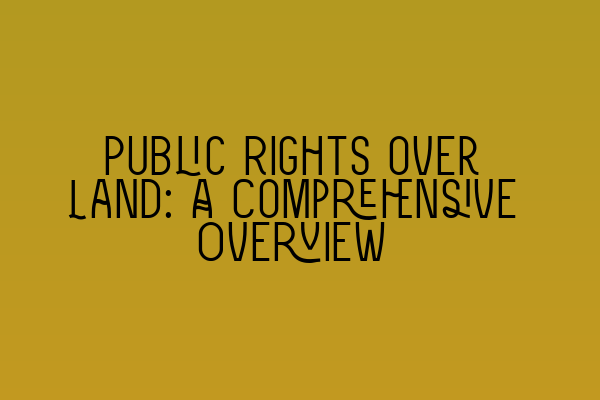Public Rights over Land: A Comprehensive Overview
When it comes to property law, one area that often presents complex issues is public rights over land. Understanding these rights is crucial for both property owners and those seeking access to public land. In this comprehensive overview, we will delve into the various types of public rights over land, their legal implications, and how they can impact property transactions.
What are public rights over land?
Public rights over land refer to the rights that individuals or the general public may have to access or use another person’s property. These rights may be established through legislation, historical usage, or common law principles. They are designed to balance the interests of private property owners with the needs and benefits of the wider community.
Types of public rights over land
There are several types of public rights over land, each with its own legal framework and implications. Let’s explore some of the most common types:
1. Right of Way
A right of way is a legal right that allows someone to enter or pass through another person’s land. This right can be either public or private. Public rights of way are established through statutory law and provide unrestricted access to the public. Private rights of way, on the other hand, are typically created through agreements or easements between specific parties.
If you are involved in a property transaction and there is a right of way over the land, it is important to consider the implications for both the buyer and seller. It is essential to review any existing right of way agreement and ensure that it is properly documented and registered.
2. Right to Access Landlocked Property
Landlocked property refers to a piece of land that is completely surrounded by other properties with no direct access to a public road or highway. In such cases, the owner of the landlocked property may have a right to access their land through a neighboring property. This right is known as an easement of necessity and is granted to prevent an owner from being landlocked and unable to enjoy their property.
When dealing with a landlocked property, it is important to establish the existence and extent of any easements of necessity. This can be done through a careful examination of historical land records and legal documents.
3. Public Access to Navigable Waters
In many jurisdictions, the public has a right of access to navigable waters such as rivers, lakes, and oceans. This means that individuals can freely navigate, fish, swim, or engage in other recreational activities on these waters. Access points to navigable waters, such as public boat ramps or beaches, are provided to facilitate this right of access.
Property owners located near navigable waters should be aware of the public’s right of access and ensure that their rights as landowners are not encroached upon. It is also important to note that the rights of the public may vary depending on the specific jurisdiction and applicable laws.
Legal implications and considerations
Public rights over land can have significant legal implications for both property owners and those seeking access to public land. Here are some key considerations:
1. Property transactions
When buying or selling a property, it is essential to thoroughly investigate and understand any public rights over the land. Buyers need to be aware of any restrictions or obligations that may affect their intended use of the property. Sellers, on the other hand, must disclose any known public rights to potential buyers.
Engaging the services of a qualified property solicitor is crucial to ensure that all legal considerations are addressed and the transaction proceeds smoothly.
2. Disputes and conflicts
Public rights over land can sometimes lead to disputes between property owners and the public. Disagreements may arise regarding the extent of the right, its proper use, or potential encroachments on private property. Resolving such disputes often requires a careful examination of relevant legislation, historical usage, and legal precedents.
If you find yourself in a dispute over public rights over land, it is advisable to seek legal advice from a property law specialist to protect your interests and explore potential resolutions.
3. Development and planning
In the context of property development and planning applications, public rights over land can influence the feasibility and design of projects. Local authorities may impose requirements or restrictions to ensure the public’s rights are upheld. Understanding these considerations early in the planning process can help mitigate potential challenges and delays.
Conclusion
Public rights over land are a complex and multifaceted aspect of property law. As property owners or individuals seeking access to public land, it is essential to understand the various types of public rights, their legal implications, and how they can affect property transactions. Seeking the guidance of a knowledgeable property solicitor is crucial to navigate these complexities and ensure that your rights and interests are protected.
Related Articles:
